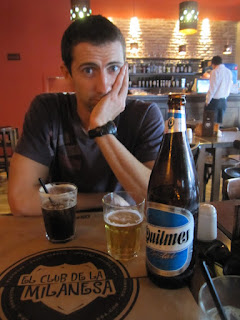 Córdoba is and has always been a university town. The Jesuits set up the first University in the country here in 1622, and the town is still rammed with students doing studenty things: Drinking, putting posters up for gigs, demonstrating against things, drinking coffee and modelling strange fashions and mullet haircuts.
Córdoba is and has always been a university town. The Jesuits set up the first University in the country here in 1622, and the town is still rammed with students doing studenty things: Drinking, putting posters up for gigs, demonstrating against things, drinking coffee and modelling strange fashions and mullet haircuts.Clearly pleased with their university, the Jesuits spent the rest of the 17th century throwing up all manner of other buildings in the area – churches, cathedrals and crypts – which were funded by a series of grand estancias (posh farms) in the surrounding countryside. Unfortunately for them, their success in Córdoba and elsewhere in the country made the Vatican and the royals back in Europe suspicious, and they decided to kick them out of all Portuguese and Spanish territories in 1759 and '67 and suppressed them completely in 1773.
 We had lots of time to see this Jesuit legacy the day after we turned up. It turned out it was National Census Day, and absolutely everything was shut as everyone had to stay in their homes to be counted by people with clipboards. Córdoba was a complete ghost-town and we wandered through empty streets all morning, around the Jesuit quarter, Plaza San Martin, then up to the park. It's a great looking city. I think it looks something like a mini Spanish version of New York – brick high-rises, parks, museums, bars and a big avenue block system.
We had lots of time to see this Jesuit legacy the day after we turned up. It turned out it was National Census Day, and absolutely everything was shut as everyone had to stay in their homes to be counted by people with clipboards. Córdoba was a complete ghost-town and we wandered through empty streets all morning, around the Jesuit quarter, Plaza San Martin, then up to the park. It's a great looking city. I think it looks something like a mini Spanish version of New York – brick high-rises, parks, museums, bars and a big avenue block system.After 4 hours of walking we were getting a little hungry and realised that we had no food, and nowhere was going to be open till 8 that night. Luckily, on the way back to our hostel we found one tiny little corner shop that had seemed to have struck a deal with a policeman standing outside, and was open and selling food to a small crowd of hungry-looking locals. Relieved, we bought their last two empañadas.
That same day, we learned that the ex-president Néstor Kirchner had died of a heart-attack. The husband of the current president, Kirchner was a hugely popular figure in Argentina, and did a lot to bring to justice many of the people responsible for the atrocities committed by the military government of the 70s. Sarah nearly caused a scene in the hostel that morning when she misunderstood the news on TV. Having watched a montage of footage of Kirchner celebrating, with the day's date in large letters underneath, Sarah turned to our hostel owner and said in Spanish, 'Ah! Happy Birthday President Kirchner!'. To which the man replied, deadpan, 'No, it's not his birthday, he's dead.'
 Having scoped out where we wanted to visit the previous day during our walk around town, and now a day behind our intended itinerary, we set off on Friday for a big day of sight-seeing. Córdoba has lots of museums, and we visited as many as we could. The best was the Palacio Ferrerya, a grand old building with a massive collection of first rate modern art. If I could rob one museum of all its works, this would be it.
Having scoped out where we wanted to visit the previous day during our walk around town, and now a day behind our intended itinerary, we set off on Friday for a big day of sight-seeing. Córdoba has lots of museums, and we visited as many as we could. The best was the Palacio Ferrerya, a grand old building with a massive collection of first rate modern art. If I could rob one museum of all its works, this would be it. After the museum, and exhausted from the hectic pace we had set, I suggested we stop for aperitifs at a cool-looking bar I had spotted. Back home in London, the guys were out celebrating the birthdays of Mr Burke and Mr Lawes, and I was keen to join in the fun as best I could. I did this by ordering an Argentine favourite – Fernet & Coke. Fernet is an Italian herbal liqueur not dissimilar to Jägermeister. It tastes horrible, but then I figured this was fitting tribute given Steve and Glennie would probably be drinking much worse.
After the museum, and exhausted from the hectic pace we had set, I suggested we stop for aperitifs at a cool-looking bar I had spotted. Back home in London, the guys were out celebrating the birthdays of Mr Burke and Mr Lawes, and I was keen to join in the fun as best I could. I did this by ordering an Argentine favourite – Fernet & Coke. Fernet is an Italian herbal liqueur not dissimilar to Jägermeister. It tastes horrible, but then I figured this was fitting tribute given Steve and Glennie would probably be drinking much worse.
0 comments:
Post a Comment